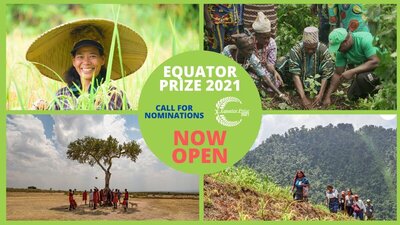Application Deadline: 10 May 2021.
Equator Prize 2021 theme: Solving our Planetary Crisis
The Equator Initiative is a United Nations-led partnership that brings together governments, civil society, grassroots organizations, and businesses to foster resilient communities by recognizing and advancing local nature-based solutions for sustainable development. The Equator Initiative creates opportunities and platforms to share knowledge and good practices, develops capacities of local communities and Indigenous peoples, informs policy through convening multi-stakeholder dialogues, and fosters enabling environments to replicate and scale up community action.
The Equator Prize 2021 will be awarded to outstanding local community and Indigenous peoples initiatives that advance innovative nature-based solutions for sustainable development. The winners will join a prestigious network of 255 leading community-based organizations from 83 countries that have been awarded the Equator Prize since 2002. Each Equator Prize winner will receive USD 10,000 and will be supported to participate in a series of policy dialogues and special events in the fall of 2021.
This year’s Equator Prize will recognize innovative initiatives from local communities and Indigenous peoples that demonstrate exceptional achievements in nature-based solutions for local sustainable development. Winning initiatives will be honored for their successes in protecting, restoring and/or sustainably managing biodiversity for positive development outcomes. Thematic priorities include:
- Action on Sustainable Food Systems
Protection, restoration and/or sustainable management of natural and agricultural ecosystems for food security.
- Action on Climate
Protection, restoration and/or sustainable management of ecosystems that help mitigate greenhouse gas emissions, and/or help communities adapt to the impacts of climate change.
- Action on Nature and Green Economy
Protection, restoration and/or sustainable management of terrestrial or marine ecosystems, biodiversity, and/or wildlife that enables sustainable and green livelihoods, enterprises, and jobs, including Indigenous economies.
Special consideration will be given to nominees working on ecosystem integrity and intactness, water security, disaster risk reduction, advocacy for land and water rights, social and environmental justice, and gender equality.
Eligibility Requirements
To be eligible for the Equator Prize 2021:
- The initiative must have been in existence for at least three years, and/or the actions taken must have been in place for at least three years.
- The nominee must be either a local community-based initiative, operating in a rural area, based in a country receiving support from the United Nations Development Programme (for a list of eligible countries, please click here); or an initiative led by Indigenous peoples in any country, operating in a rural area.
- The actions taken by the nominee must be nature-based, and must deliver benefits related to two or more Sustainable Development Goals (SDGs).
Selection Criteria
Equator Prize 2021 winners will be selected by an independent Technical Advisory Committee, which will assess nominations based on the following criteria:
- Impact: The extent to which the nominated initiative has resulted in measurable and positive environmental, social and economic impacts that deliver benefits towards the achievement of the Sustainable Development Goals;
- Innovation: The extent to which the nominated initiative demonstrates new approaches and models that overcome prevailing constraints, and could offer fundamentally new approaches to adapting to and/or mitigating climate change, while advancing local sustainable development;
- Scalability and/or replicability: The extent to which the nominated initiative could be scaled up sub-nationally or nationally and/or, the extent to which the initiative can be replicated within the country and beyond;
- Resilience, Adaptability, and Self-Sufficiency: The extent to which the nominated initiative demonstrates adaptability to environmental, social and economic change, resilience in the face of external pressures, and improved capacity for local self-sufficiency;
- Reduced inequalities: The extent to which the initiative reduces inequalities in income as well as those based on age, sex, disability, race, ethnicity, origin, religion or economic or other status, in particular for the poor;
- Social Inclusion: The extent to which the nominated initiative includes youth, elders, indigenous peoples, and other diverse groups in the decision-making processes and the actions that affect them;
- Gender Equality: The extent to which the nominated initiative promotes the equality and empowerment of women and girls.
For More Information:

